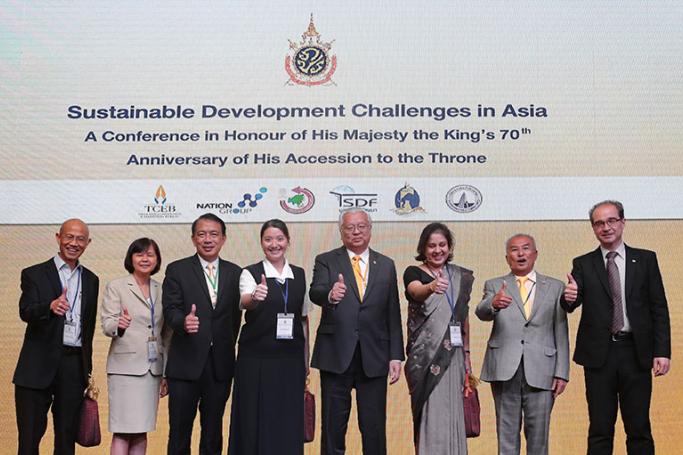Foreign and local experts attended the “Sustainable Development Challenges in Asia” conference held in Bangkok, Thailand, on 8 June, sharing their experiences on promoting sustainable development programmes in their respective countries.
The event, honouring His Majesty the King's 70th anniversary of his accession to the throne, saw views exchanged by Lamiya Morshed, Executive Director of Yunus Centre in Bangladesh, Monica Sy from the Buddhist Compassion Relief Tzu Chi Foundation in Taiwan and Disnadda Diskul, Secretary General of the Royal Initiatives Discovery Institute, Thailand.
King Bhumibol Adulyadej introduced a philosophy known as the ‘Sufficiency Economy’ as Thailand’s path toward sustainable development more than half a century ago. It was designed to achieve a balance between consumer ambitions and the real needs of people and available resources.
Stefanos Fotiou, Director at the Environment and Development Division of UNESCAP, who delivered the keynote address at the event, said, “The efficient management of natural resources is at the centre of sustainable development as well as the Sufficiency Economy Philosophy.”
He also pointed out that the Asia-Pacific region needs to tackle three major challenges: the rising demand for natural resources and the ecosystem services that they provide, the increasing inequality in the access to resources and increasing resource depletion.
The Yunus Centre's Lamiya Morshed elaborated on issues in Bangladesh and the sustainable development model of their foundation which covers millions of poor in the country.
Monica Sy from the Tzu Chi Foundation said their group operates on donations and utilises volunteers to provide medical services and humanitarian relief throughout different corners of the world.
Disnadda Diskul from the Royal Initiatives Discovery Institute shared his experience from the Mae Fah Luang foundation regarding reviving forests and ensuring sustainable income for farmers in areas where they work.
The chairman of the foundation insisted sustainable development can be implemented anywhere, not just in Thailand, warning that the world is heading towards a tipping point and will be on the verge of collapse without sustainable development.
“People are the key to sustainable development which is to be carried out through the three basics of survival, sufficiency and sustainability,” he added.
The conference ended with the panel unanimously agreeing on the crucial role of government bodies in the implementation of sustainable development.
Sufficiency Economy policy became all the more potent after Thailand was hit by the Asian economic crisis in 1997 and 1998.
The idea is that a similar approach should be taken to human development in economics, based on three components— moderation, reasonableness, and prudence— and two underlying conditions: knowledge and virtue.
The king also believes this philosophy can be adapted or modified to suit other countries’ conditions and localities, as they respond to the universal crisis.
The event was jointly organised by the Thailand Convention and Exhibition Bureau, Nation Multimedia Group, Thailand Sustainable Development Foundation, Royal Initiatives Discovery Foundation, CH. Karnchang Public Company Limited and Institute of Asian Studies, Chulalongkorn University.
You are viewing the old site.
Please update your bookmark to https://eng.mizzima.com.
Mizzima Weekly Magazine Issue...
14 December 2023
New UK Burma sanctions welcome...
13 December 2023
Spring Revolution Daily News f...
13 December 2023
Spring Revolution Daily News f...
12 December 2023
Spring Revolution Daily News f...
11 December 2023
Spring Revolution Daily News f...
08 December 2023
Spring Revolution Daily News f...
07 December 2023
Diaspora journalists increasin...
07 December 2023
State Counsellor urges people not to exploit the pandemic and election for military gain












